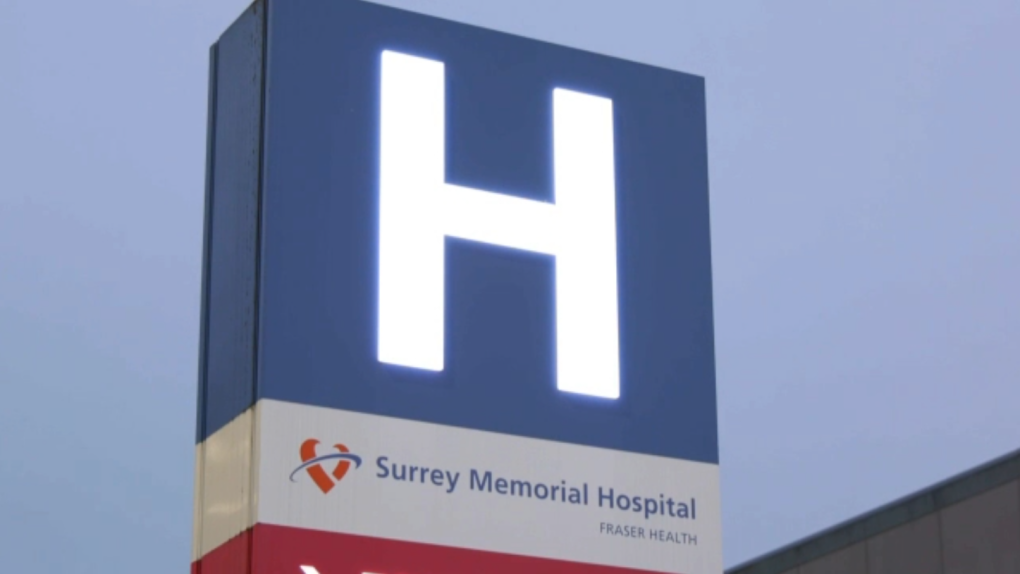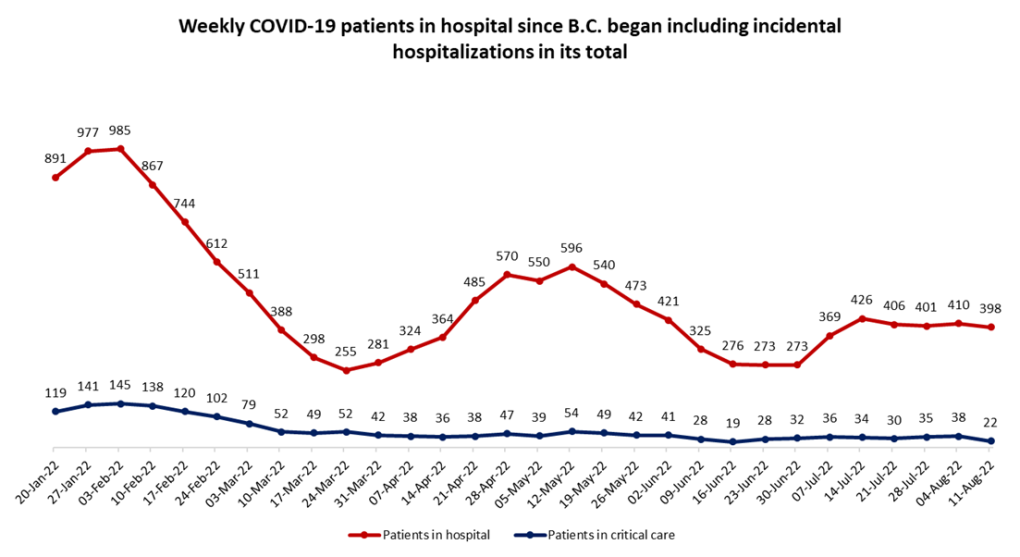Number of COVID-19 patients in B.C. hospitals dips below 400
 A sign at the entrance to Surrey Memorial Hospital is seen on Saturday, Feb. 5, 2022. (CTV)
A sign at the entrance to Surrey Memorial Hospital is seen on Saturday, Feb. 5, 2022. (CTV)
For the first time since early July, there are fewer than 400 people in B.C. hospitals with COVID-19.
The 385 patients in hospital as of Thursday is the lowest total the B.C. Centre for Disease Control has recorded since July 7, but it's also a fairly small drop from what the hospital population has been for the last four weeks.
 The number of COVID-positive patients in B.C. hospitals on Thursdays since January is shown. (CTV)
The number of COVID-positive patients in B.C. hospitals on Thursdays since January is shown. (CTV)
The number of coronavirus patients in critical care dropped more significantly this week, falling from 38 last Thursday to 22 this week, the lowest that number has been since June 16.
The BCCDC's weekly hospitalization totals include both those with serious cases of COVID-19 and those who are admitted to hospital for other reasons and test positive incidentally. Since the province switched to this "hospital census" method of counting in January, there have been as many as 985 people in hospital on a Thursday and as few as 255.
CASES AND WASTEWATER
Hospitalizations are generally considered a lagging indicator of COVID-19 transmission, meaning they tend to start increasing or decreasing a week or more after infections do.
In B.C., this effect is mitigated, somewhat, by the fact that the latest available data on transmission is nearly a week old.
The BCCDC reports new, lab-confirmed cases and wastewater surveillance data by "epidemiological week," a time-frame that runs from Sunday to Saturday. The most recent data on COVID-19 cases in B.C., therefore, is from the week that ended Aug. 6.
Like the hospitalization data, positive lab tests and wastewater surveillance have been showing a plateau or slight decline in coronavirus transmission in recent weeks.
The BCCDC's weekly report shows 900 new positive tests for the week of July 31 to Aug. 6, down slightly from the 983 reported during the previous epidemiological week.
These totals reflect only the results of lab-based tests, which are not available to most British Columbians with COVID-19 symptoms under the province's current testing strategy. The BCCDC does not collect or report the results of at-home rapid tests, meaning the vast majority of COVID-19 cases in the province are not officially tracked.
Wastewater surveillance data from Metro Vancouver can provide some insight into the spread of the coronavirus among people not included in the official total.
Like the official case count, wastewater data has suggested flat or declining transmission in recent weeks.
"Though there continues to be week-to-week variability, SARS-CoV-2 viral loads generally continue to decrease from their most recent peak in late-June or early-July in Metro Vancouver wastewater," the BCCDC says in its latest situation report, which covers wastewater data through Aug. 6.
COVID-19 DEATHS
Also included in the situation report is an update on deaths caused by COVID-19 in B.C.
Since April 2, the province has been reporting "30-day, all-cause mortality," a figure that includes anyone who dies within 30 days of a positive COVID-19 test. The province's Vital Statistics agency then determines whether the coronavirus was the underlying cause of death, a process that can take eight weeks.
According to the BCCDC, Vital Statistics has identified 363 COVID-caused deaths that occurred between April 2 and July 30, or about 3 per day.
The vast majority of deaths continue to be among those ages 80 and older, but the latest report shows at least one person in every age group but one has succumbed to COVID-19 in the last four months.
VACCINATION DATA
B.C. administered 25,256 doses of COVID-19 vaccine during the week of July 31 to Aug. 6, the lowest weekly total since the first week of April.
Most of those doses – 13,797 or about 55 per cent – were second boosters, or fourth overall doses.
Another 6,016 doses – about 24 per cent – were first shots. That's the highest number of first doses administered in months, and more than four times the number administered in the last week of July, a fact that likely reflects the inclusion of the newly eligible under-five age group in the total.
The province has estimated that there are about 208,000 children in this age group, which became eligible for COVID-19 vaccines in B.C. as of Aug. 2.
Last week, the Ministry of Health told CTV News just 13,606 of those children – or about 6.5 per cent – had been registered for vaccination.
Correction
This story has been updated to reflect a change to the number of patients in hospital and critical care according to the BCCDC's COVID-19 dashboard.
CTVNews.ca Top Stories

Trudeau calls violence in Montreal 'appalling' as NATO protest continues
Anti-NATO protesters gathered again in Montreal on Saturday to demand Canada withdraw from the alliance, a day after a demonstration organized by different groups resulted in arrests, burned cars and shattered windows.
7 suspects, including 13-year-old, charged following 'violent' home invasion north of Toronto
Seven teenage suspects, including a 13-year-old, have been arrested following a targeted and “violent” home invasion in Vaughan on Friday, police say.
These vascular risks are strongly associated with severe stroke, researchers say
Many risk factors can lead to a stroke, but the magnitude of risk from some of these conditions or behaviours may have a stronger association with severe stroke compared with mild stroke, according to a new study.
Widow of Chinese businessman who was executed for murder can sell her Vancouver house, court rules
A murder in China and a civil lawsuit in B.C. have been preventing the sale of multiple Vancouver homes, but one of them could soon hit the market after a court ruling.
Cher 'shocked' to discover her legal name when she applied to change it
Cher recalls a curious interlude from her rich and many-chaptered history in her new book 'Cher: The Memoir, Part One.'
Black bear killed in self-defence after attack on dog-walker in Maple Ridge, B.C.
A black bear has died following a brawl with a man on a trail in Maple Ridge, B.C.
Retiring? Here's how to switch from saving for your golden years to spending
The last paycheque from a decades-long career arrives next Friday and the nest egg you built during those working years will now turn into a main source of income. It can be a jarring switch from saving for retirement to spending in retirement.
Canadian neurosurgeons seek six patients for Musk's Neuralink brain study
Canadian neurosurgeons in partnership with Elon Musk's Neuralink have regulatory approval to recruit six patients with paralysis willing to have a thousand electrode contacts in their brains.
Police thought this gnome looked out of place. Then they tested it for drugs
During a recent narcotics investigation, Dutch police said they found a garden gnome made of approximately two kilograms of MDMA.
































